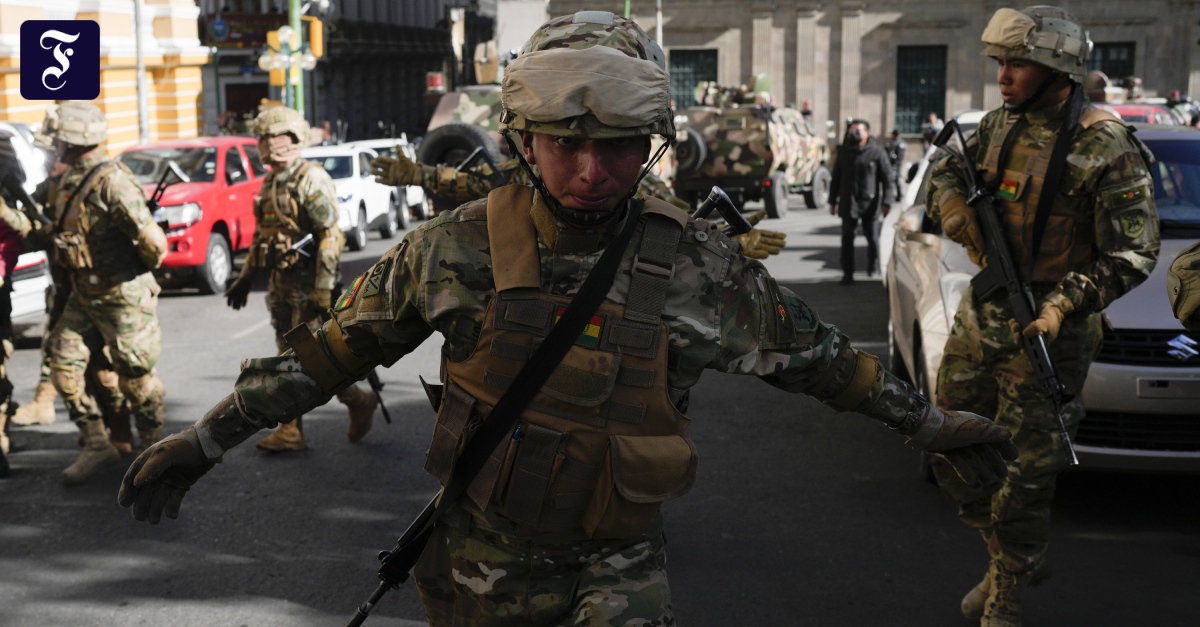Der entlassene Befehlshaber der bolivianischen Armee, General Juan José Zúñiga, hat sich am Mittwoch Zugang zum Präsidentenpalast in La Paz verschafft. Zuvor hatte er erklärt, das Militär werde den Präsidentenpalast übernehmen. Auf Videos in sozialen Netzwerken waren Einheiten zu sehen, die Regierungsinstitutionen betraten. Ein gepanzertes Fahrzeug durchbrach die Tür zum Palast an der Plaza Murillo.
Zúñiga sagte vor Kameras: „Es wird sicherlich ein neues Kabinett geben, die Dinge werden sich ändern, aber unser Land kann so nicht weitermachen wie bisher.“ Auf die Frage, ob er den gewählten Präsidenten Luis Alberto Arce als Staatschef anerkenne, antwortete er später: „Im Moment noch“. Über seine Motive sagte er: „Wir sind gekommen, um unseren Unmut zu äußern.“
Präsident Arce verurteilte das Vorgehen und forderte die Bevölkerung auf, sich gegen den Putsch zur Wehr zu setzen. „Das bolivianische Volk ist heute aufgerufen, sich gegen den Staatsstreich und für die Demokratie zu wehren und zu mobilisieren“, sagte Arce in einer im Fernsehen ausgestrahlten Botschaft aus dem Präsidentenpalast. „Wir können nicht zulassen, dass Putschversuche erneut bolivianische Menschenleben kosten“, fügte er hinzu. Wenig später wurde José Sánchez Velásquez als neuer Befehlshaber im Präsidentenpalast vereidigt.
Stunden nach Beginn des Putschversuches zogen Panzer und Soldaten von der Plaza Murillo ab. General Zúñiga wurde festgenommen und in ein Polizeifahrzeug gebracht, wie Aufnahmen des Staatsfernsehens zeigten.
Arce hatte, nachdem sich das Militär im Präsidentenpalast Zugang verschafft hatte, Zúñiga befohlen, die Streitkräfte abzuziehen. Zúñiga verweigerte dies, wurde berichtet.

The situation was confusing at times. There was initially no information about the number of mobilized units. There were also reportedly riots between the military and the population on Plaza Murillo in La Paz, which also resulted in injuries. Explosions were reported.
Vice President David Choquehuanca spoke of a coup “against our democratically elected government.”
Bolivia's former president Evo Morales had called for a public mobilization to defend “the fatherland” against “this attempted coup.” Arce and Morales belong to the same socialist movement, but have fallen out.
Fired for comments about Morales?
According to a report by the news portal “El Deber”, Zúñiga was removed from office on Tuesday. He had made a name for himself with controversial statements about former President Morales. In a television interview, he had called Morales a “demagogue” and a “traitor”. According to the report, Zúñiga did not accept the dismissal and announced that he would also appear in his office on Wednesday.
The actions of the military coup were criticized by neighboring countries. The governments of Brazil and Uruguay, among others, condemned the coup in Bolivia. The coup was a “clear threat to democracy,” it was said from Brasilia, for example.
Luis Almagro, secretary general of the Organization of American States (OAS), a pan-American organization, condemned the mobilizations in the “most forceful manner” and said “the army must subordinate itself to the legitimately elected civil power.”
EU reactions
EU Commission President Ursula von der Leyen criticized the attempted coup. “I firmly condemn the attempts to overthrow the democratically elected government of Bolivia,” she wrote on X late Wednesday evening. The European Union stands by the side of the democracies. “We express our strong support for the constitutional order and the rule of law in Bolivia.”
EU Council President Charles Michel wrote on X: “I strongly condemn the military uprising against the Bolivian constitutional order and the democratically elected government of President Arce.” The EU supports democracy and the Bolivian people.
EU chief diplomat Josep Borrell said on X that the EU condemns any attempt to undermine the constitutional order and overthrow democratically elected governments. It expressed its solidarity with the Bolivian government and the Bolivian people.

